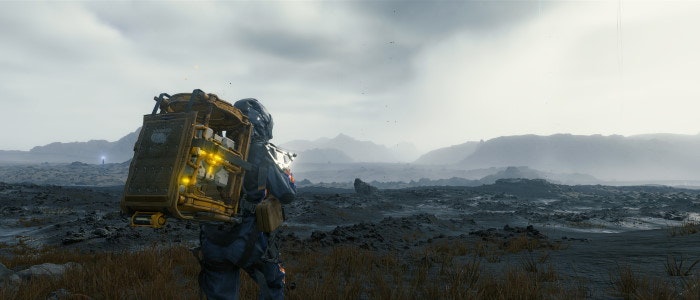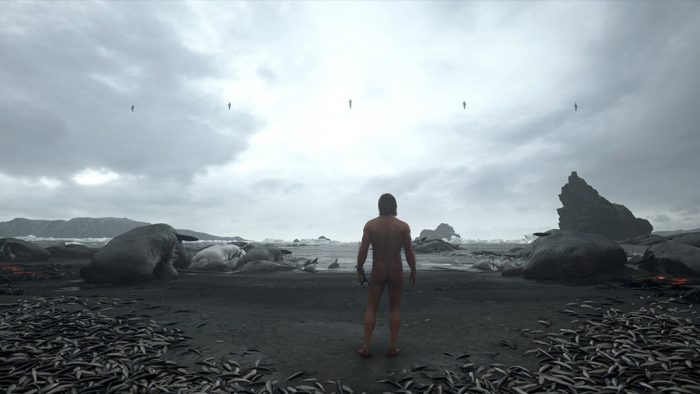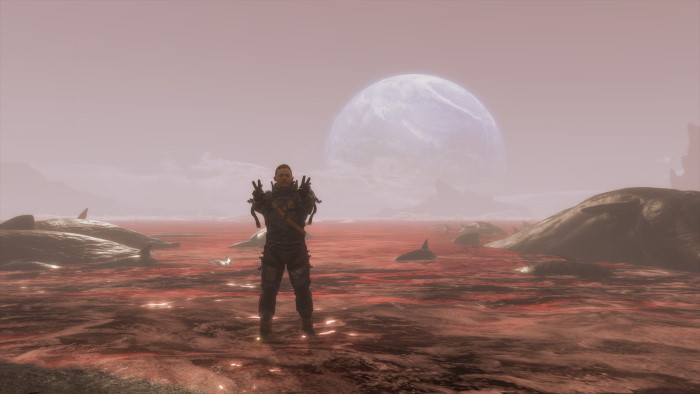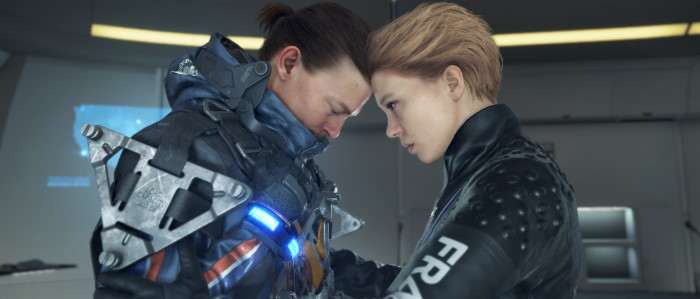Note: This post was originally a bonus issue for the Nothing Here newsletter. They usually stay locked for a year, but I decide to unlock this one early for the 1-year anniversary of Death Stranding‘s release.
 ess
ess
Life imitates art
Death Stranding was originally released for PlayStation 4 on November 8th, 2019. In the world of Death Stranding, a near-Extinction level event (called “the Death Stranding”) has forced survivors to live confined indoors, relying on porters to deliver most of what they need to survive and thrive. What was meant as a weird and unique sort of post-apocalypse ended up paralleling the way many of us have spent large chunks of 2020.
Playing as Sam Porter Bridges (yes, the character names in Death Stranding are consistently terrible), I have delivered food, booze, books, medicine, and even fresh hot pizza to lonely survivors…all of which I have also had delivered to my house during lockdown, by invariably underpaid delivery drivers wearing masks. (While Death Stranding has a number of hat and glasses options, they missed out on including face masks. This inclusion would have surely cemented Kojima’s status as an actual prophet*.)
And while the porters in Death Stranding couldn’t exactly be called “gig economy workers” they are literally paid in Likes, further cementing the link between the game world and the lives of app-based delivery workers who run the risk of losing income if their rating (or, how well liked they are) drops too low. Not only that, but after moving into the game’s second area you become a contractor for a second courier company, which is reminiscent of the way precarious app workers need to sign up for multiple competing apps just to ensure they have enough work coming in. In Death Stranding though, Bridges is happy for you to work with and for Fragile Express, but in the dystopian (possibly apocalyptic) setting that we call “the real world,” workers are forced to run competing apps on separate phones, thanks to Silicon Valley arrogance and its anti-competitive nature, leading to dashboards that slowly look more like something from the cyberpunk oeuvre. (And don’t get me started on the waste of rare minerals, energy, etc.)
But while Death Stranding might seem a little close to home in some ways, there’s another way that the developers entirely missed the mark.

Hindsight is…
I began playing Death Stranding on its PC release, on the 15th of July, 2020. By the middle of July we’d watched America war with itself for close to 2 months following the murder of George Floyd. We saw police continue to murder and brutalise people (especially people of colour) even while under the heaviest scrutiny they have possibly ever experienced, demonstrating exactly how far beyond reformation these gangs in blue really are. We saw the National Guard deployed, and we saw the President threaten to deploy the US military in cities across the country. We saw faceless, nameless, identification-less agents from a variety of federal agencies black bag US citizens and threaten others at gunpoint. (We also saw a mass protest movement, and we saw people willing to stand against a corrupt state in numbers never before witnessed in the USA.) We saw far-right militias on the streets and police ignoring (or fraternising with) them, we saw police committing and allowing violence, just as long as it was wielded against the people standing up for the rights of Black people not to be killed in their homes and on the streets.
I don’t need to remind you about all this (if you were keeping up with the news and/or the newsletter during that time, you know exactly what I’m talking about), but I mention it to provide some context. Because it was against this real-life backdrop that the characters of Death Stranding begged Sam Porter Bridges to help rebuild America by trudging across the continent on foot and reconnecting a series of bunkers and underground towns to the chiral network (think sci-fi internet). As I’m sure you can imagine it’s an incongruous message for 2020. These people – the President, her daughter, and her advisors – begged Sam (ie me) to help rebuild America, but all I could think was “Why would I ever want to do that? It’s a failed experiment.” That introduction to the game, at that point in time, was almost enough to make me stop playing. And indeed, it’s odd that after finishing with Metal Gear Solid, a series that was often critical of American militarism and particularly the corporatisation thereof, Hideo Kojima opens his next game with what can only be read as pro-America propaganda.
So while delivering goods to people, ahem, stranded in their homes made Death Stranding feel very of the moment, in other ways it feels like a relic of 2007 – a time when America was bolstered by war and post-9/11 nationalism, and when American people, the government, military, and Hollywood could all believe in the idea of America as an unqualified force for good. It was a time when it was easy to buy into this rebooted form of the American Dream (powered by a housing market racing toward collapse); before the wars in the Middle East revealed themselves to be quagmires, and before the Global Financial Crisis tore a veil from our eyes. The veils have continued to fall, with the acceleration of mass shootings, far-right violence, police violence, racism, ur-fascism, and a continued degradation of conditions for your average American while the elite continue to gain wealth and power, even as their truly disgusting predilections (Epstein, etc) and corruptions (the Panama Papers) are revealed. All told, in 2020 Death Stranding feels both timely in the context of our global pandemic and completely anachronistic in its view of America**.
I guess one of the reasons why I was able to look past the American Exceptionalism on display in the game’s opening hours is because Death Stranding is obviously a global product, despite its story. Hideo Kojima is Japanese, as are most of the people who worked on the game, the cast includes the French Léa Seydoux and the Danish Mads Mikkelsen among others, much of the game’s music is provided by the Icelandic dream pop band Low Roar, and the geography of the game is obviously (and painstakingly) modelled on Iceland, even if the writing wants to convince us it’s the landscape of the former United States of America.
It’s almost like Kojima et al felt they needed to set the game in America because the mass cultural export of the idea of America has made it into a sort of de facto setting, even if (or perhaps especially if) the story is about a global event. Besides Norman Reedus’ accent, very little in Death Stranding feels American at all.
Fully automated lockdown communism
It seems pointless to offer a spoiler warning for a game that is so singularly odd and fragmented and that really needs to be experienced, but here it is anyway:
SPOILER WARNING
Toward the end of the game it’s revealed that the President of the United States is herself an Extinction Event. It seems like I could make a pretty lazy joke here (something that rhymes with Ronald Grump spook-clear footfall), but that’s baby-brain centrist bullshit, and we can do better than that. Instead I’m going to suggest that POTUS = EE is a comment on the onrushing/unfolding climate change apocalypse. The POTUS is, after all, the head of state and the embodiment of the United States, so with such a sparsely-populated game it makes sense for the President to stand in for the nation as a whole. And the USA is the epitome of the Western world with all the consumerism, waste, and environmental damage that entails (not to mention the massive and massively environmentally damaging US military, which refuses to let itself be in any way curtailed by international climate change agreements). The President brings about the Death Stranding in the same way that the brand of consumerism America has been exporting to the rest of the world since the end of WW2 is bringing about our own slow apocalypse.
SPOILER WANING

So, the titular Death Stranding is a metaphor for climate change apocalypse (making this piece part 2 in the ongoing series Corey Sees Climate Change Everywhere). What’s interesting then is that the game offers up socialism as our only way to face this threat.
(Now I’m realising the Iceland-America displacement was entirely deliberate: suggesting that America’s only chance of rebuilding after its inevitable collapse is to model itself after Scandinavian countries with healthy social welfare systems. [I’m being facetious.])
Now we get to the multiplayer portion of the game. Beginning with Demon Souls (if not before), we’ve seen a sort of asynchronous, parallel, or ambient multiplayer movement coming out of Japan (the Souls games, Journey, Nier: Automata, and Death Stranding are just some examples I’ve played – I’m sure there are plenty more). In the Souls games you can call other players into your game world for jolly cooperation or brutal combat, but you can also leave messages on the landscape that might bleed through into other player’s worlds. Taken from a predefined selection of messages, players found ways to be helpful or funny, or even lure unsuspecting players to their deaths. A similar message system is in place in Death Stranding, and while it might be possible to trick another porter into jumping or driving off a cliff to their death, it’s quite unlikely. Instead you’re far more likely to find earnest suggestions, requests, hints, and even tiny buffs, with some of these messages imparting Likes, BB happiness, stamina, and speed. Help in the form of structures and vehicles constructed by other players can also seep into your world (and vice versa), and you could spend hours delivering packages lost or deposited by other players, earning you both more of those precious Likes. These systems change what is a deliberately slow and solitary game into something that feels subtly communal. Your progression is never significantly helped or hindered by these other players, but seeing the strands of them reach into your game reminds you that there are other people out there, experiencing what you’re experiencing, and sharing your struggles and victories.
(In this way the multiplayer aspect also reminds me of the religion of Mercerism from Philip K. Dick’s Do Androids Dream of Electric Sheep? With Mercerism, a person uses an empathy box to connect to a figure known as William Mercer as he struggles up a hill while being accosted and assaulted by unseen assailants. These attacks can even manifest real-world wounds. But while a person is connected to Mercer going through his cycle of pain, death, rebirth and more pain, they are also connected to everyone else who is using an empathy box at that same moment, sharing the pain, but also encouragement, love, joy, and all the rest. It could even be read as the platonic ideal of what the internet could have been…)
So the multiplayer elements of the game encourage cooperation and mutual aid through these ambient connections between players, but these connections are also literally the point of the game and the foundation of its story and themes.
I came across a long review of/essay about Death Stranding*** in which the author complained at length about the economics of the game not making sense. On the contrary, I’d suggest the game’s economics are best summed up by Karl Marx: From each according to his ability, to each according to his needs. Earlier I mentioned that the game’s porters are paid in Likes – this isn’t because they’re a downtrodden class in some sort of dystopia, but rather because Likes are the only form of payment available to a person. You deliver a massive variety of different items and materials all over the Icelandic States of America, but there is never talk of any payment made or received – not even bartering. The couple growing wheat send bread and beer to other settlements because they have the resources, equipment, and experience necessary to do so. The doctor provides medical equipment, the staff at the weather station provides data to help porters navigate the dangers of timefall, the engineer provides schematics for his latest creations, and the spiritualist provides magic rocks and homeopathic medicines (okay, okay, it’s not a perfect system). The chiral network that Sam Porter Bridges (ugh) is rebuilding helps everyone across the continent remain in contact so that they might share pooled resources, and also lets them share knowledge, including designs that can be 3D printed at every connected bunker or settlement. It could be seen as a partially automated lockdown communism facilitated by 3D printing crossed with a sort of library socialism built on the (muscular and no doubt extremely sore) backs of the portertariat.
Don’t be so serious
In those opening hours of Death Stranding I was certain I would be able to write about the game. It turns out this piece is a little disjointed and fragmented, much like the game it’s about.

I’m almost certain it’s not really a game about socialism, but it earnestly believes that connecting with other people in a spirit of love and generosity may be the highest human calling and might just help us survive the disaster we find ourselves in. For all the games terrible character names, dumps of exposition, and other assorted weirdnesses and minor failures, it still feels like something special because of its utter dedication to this message of connection and the genuine moments of contact and love shared between delightful characters.
There’s another Philip K. Dick story that comes to mind, called War Game. The story is about a couple of customs inspectors charged with ensuring nothing dangerous crosses the border from the nefarious Ganymedians. The inspectors are suspicious of a citadel game that they fear could be a bomb, and while by the end of the story they’re pretty sure it’s just a therapeutic toy, they still don’t let it through just to be on the safe side. What they do let pass is a Monopoly-style board game, but its revealed that the true purpose of the game is to teach Earthling children the value not of accumulating resources, but of surrendering your holdings (say, to an invading alien force). The vast majority of multiplayer games are competitive, usually violently so (both in terms of the games requiring players to interact with one another through the language of violence, and with the violence spilling over into the real world with swatting), but we can’t compete our way out of the coming troubles. Our best hope is cooperation and connection, and we need a culture that recognises and reinforces that. Kojima has talked about Death Stranding possibly being the first of a new subgenre of Strand-likes, and I would really like to see what else Kojima and others could do in the space… I’d especially like to see a deliberately socialist and leftist game, instead of a massive corporate product that seemed to get there much by accident.
*Already, throughout the Metal Gear Solid series, Hideo Kojima has proven his prophetic gift. The most obvious example comes at the end of Metal Gear Solid 2 where Kojima had predicted the current state of social media, and the way it has inundated our lives… even though the game came out back in 2001. That was two years before even Myspace was founded. He extrapolated everything about our social media lives from looking at LiveJournal and similarly small blogging sites.
**To be a more accurate simulation of the current American experience, there would need to be people leaving their bunkers in order to protest the lockdown measures, carrying placards that read “Timefall is a hoax” and “Have you ever even seen a BT?”, and threatening the clouds with their AR-15s while wearing sweaters stained with pasketti sauce.
***It’s only because of this same reviessay that I know Diehardman (yes, you read that right) is named (ugh) Diehardman, because his real name was John McClane.
I’ve been trying to read every thoughtful article on Death Stranding that I can find, and yours fit the bill. Excellent article, thank you for posting it.
I’m pretty sure I read the article you mention as dealing with economics; any reason you didn’t post a link? I would think that anyone who arrived here because of an interest in the game would also find his writing interesting too.
As an American who’s as little enamored with promulgation of American exceptionalism as you seem to be, I’d like to nonetheless offer a slightly different perspective. You mention that Kojima seemed to have abandoned the themes he’d previously focused on and instead begun DS with ‘pro-American propaganda’. I would posit that the themes in DS instead were a logical next step from what he’d covered before. In the MGS series, as you pointed out, he attempted to tackle militarism, the military-industrial complex, etc. And in MGS2 in particular, again as you pointed out, he basically predicted the appalling abyss of crap that social media has become, and the prime role that our digital lives have played in making people as a whole objectively dumber and less able to exercise critical thinking skills.
Especially over the past several years, a compelling case could be made that nowhere else in the world epitomized the caustic divide driven by utter stupidity — largely thanks to the pervasiveness of social media — as concretely as the US. And perhaps no other country had such an openly bitter debate with itself, with one side insisting on a viewpoint that was so starkly in contrast to the ideals that country was supposed to have stood for for so long. (Or maybe I’m wrong and my view is in itself a manifestation of American exceptionalist thinking!)
And so, what could be more natural than Kojima setting the game in the US? In several interviews before and after the game’s release it seemed clear to me that while he mentioned being concerned with an overall deterioration of society worldwide, his focus was on the US. As you pointed out, the actual game has little in common with the real country other than references to the President etc. But perhaps Kojima simply saw the US as the ideal example of a country where connections (and I would argue, very heavily driven by social media) had deteriorated so thoroughly (and thus become the manifestation of that which he warned us of in MGS2) that it was worth designing a game set in the US that instead encouraged the most basic form of connection possible: the near-anonymous ‘like’ that can only be given in appreciation for something another player has done, almost akin to the ‘platonic ideal of what the internet could have been’ that the Mercer box offered.
To me, I saw that opening as not so much promoting any kind of uniquely-American values, or even arguing that America itself had some kind of lost purity that could be reclaimed; but rather, that America sadly epitomized the damage that unchecked social media-driven news sources and vain popularity contests could wreak on a populace; and how maybe, just maybe, if we could find a way to get back to being human with each other again, we could right this ship and repair some of the damage that’s been done to the national fabric. Not just here in the US, but anywhere.
That’s the lesson I’d like to take from DS. Whether there’s anything left saving is another question, and perhaps the real answer lies not in concerning ourselves with irreparable national cleavage but rather in focusing on our communities on a smaller scale. Either way, I’d like to think that Kojima was subverting what the ‘like’ has become and reduced it to its most pure essence: a tool that can only be used for good, and with no benefit to the giver. Only when and if we become truly selfless and empathetic can we hope to forge real connections again.
Thanks for the thoughtful response. First off, I think I didn’t link to that essay just because I had trouble finding it when I went back looking for it. After having a skim I’m pretty sure it was this one. I’ve gone ahead and added that link to the post.
And I think you’re right in regards to how/why Kojima chose to use the US as a setting. I also had someone else take issue with me referring to the game as being “accidentally socialist” when they believed it was obviously deliberate, and I honestly just think it was the timing of the game’s PC release that made me react so negatively to the Amerocentric opening. Though I still think if the game had framed your mission as “creating/connecting a massive mutual aid network” rather than “re-connecting America for the sake of a new American state” then it would have been much stronger ideologically. Still use the American continent as a setting to push back against American imperialism, exceptionalism, frontierism, etc, but with an explicitly leftist or socialist goal.
I still hope we see more strandlikes, because I had such an incredible experience with the game and desperately want to see what other people can do when they expand on the foundation that Kojima laid down.